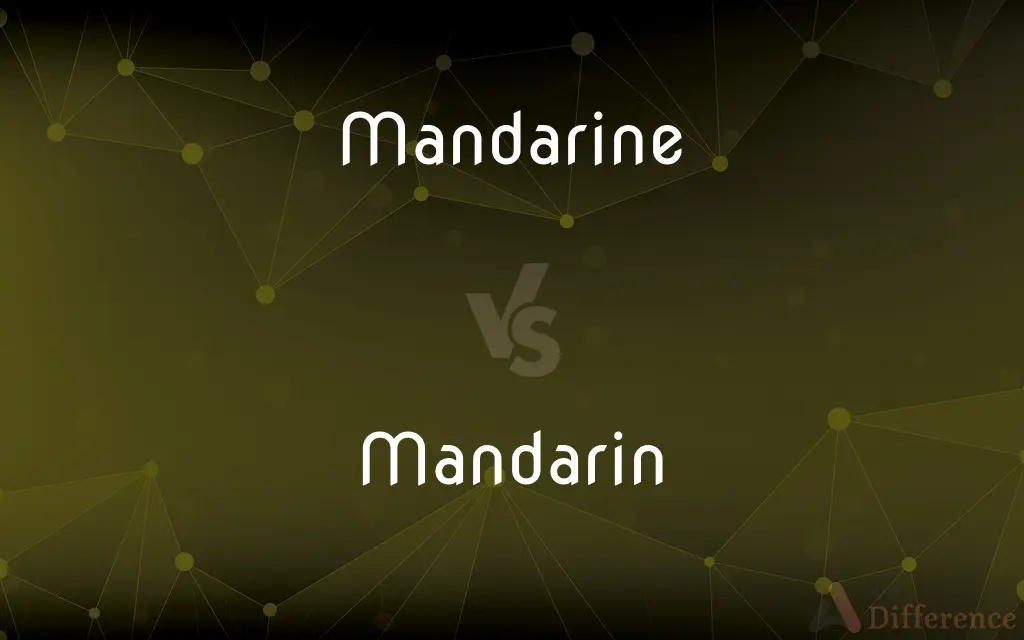Mandarine vs. Mandarin — What's the Difference?
Edited by Tayyaba Rehman — By Urooj Arif — Updated on March 27, 2024
Mandarine often refers to a female mandarin or a variant of the mandarin orange. Mandarin denotes a high-ranking official in imperial China or a major group of Chinese dialects.

Difference Between Mandarine and Mandarin
Table of Contents
ADVERTISEMENT
Key Differences
Mandarine is less commonly used and might refer to the feminine form of mandarin, especially in languages with gendered nouns, or it could be an alternative spelling for a type of small, sweet citrus fruit, more commonly known as mandarin. Mandarin, on the other hand, is a term with multiple significant uses, including a high-ranking official in historical imperial China, a major group of Chinese dialects spoken by about a billion people, and the mandarin orange, a popular citrus fruit.
Mandarine, when used, often specifically references the mandarin orange, highlighting its role in culinary and cultural contexts. The term might also appear in translations or discussions emphasizing gender, though such usage is rare. Mandarin, whereas, encompasses a broader spectrum of meanings, not only referring to the citrus fruit but also to an influential language and historical Chinese bureaucrats. This multifaceted nature of "mandarin" makes it a term of considerable cultural and linguistic importance.
In terms of language, there is no "mandarine" language; the correct term is Mandarin, which is one of the most spoken languages worldwide and serves as the official language of China and Taiwan. It's also one of the four official languages of Singapore. The linguistic aspect of Mandarin is crucial for understanding Chinese culture, literature, and governance.
The historical role of mandarins in China adds a layer of complexity to the term. These officials were selected through the imperial examination system and were crucial in administration, representing an elite class in Chinese society. In contrast, there is no historical or cultural role associated with "mandarine," outside of its possible mistaken use for "mandarin."
When discussing the citrus fruit, both "mandarine" and "mandarin" can refer to the same fruit, though "mandarin" is the more commonly accepted term in English. Mandarins are known for their sweet flavor and ease of peeling, making them a favored snack around the world.
ADVERTISEMENT
Comparison Chart
Definition
A variant spelling for mandarin orange; rarely, a female mandarin.
Refers to a high-ranking official, a language, or a citrus fruit.
Common Usage
Less common, mainly used for the fruit.
Widely used in historical, linguistic, and culinary contexts.
Linguistic Relevance
Not applicable.
Denotes a major group of Chinese dialects.
Historical Significance
Not historically significant.
Refers to elite officials in imperial China.
Cultural Impact
Minimal, outside of possible culinary references.
Significant, relating to governance, language, and cuisine.
Compare with Definitions
Mandarine
Rarely used as a feminine form of mandarin in certain languages.
The novel featured a character described as a mandarine in the imperial court.
Mandarin
A high-ranking official in imperial China.
The museum exhibit on ancient China displayed artifacts from the era of mandarins.
Mandarine
Alternative spelling for mandarin orange, a small citrus fruit.
She added slices of mandarine to the salad for a citrusy zest.
Mandarin
A major group of Chinese dialects, the official language of China.
Learning Mandarin is essential for understanding Chinese culture.
Mandarine
Alternative spelling of mandarin
Mandarin
Relating to or characteristic of Mandarin or mandarins.
The documentary provided insights into Mandarin architecture.
Mandarin
Used to describe something of or relating to China or the Chinese language.
The Mandarin edition of the book offers a direct insight into the author’s original expressions.
Mandarin
A type of small, sweet citrus fruit.
Mandarin oranges are a popular treat during the Chinese New Year.
Mandarin
Any of a group of related dialects of Chinese spoken principally in the north and west of China.
Mandarin
The official national standard spoken language of China, based on the Mandarin dialect spoken in and around Beijing. Also called Guoyu, Putonghua.
Mandarin
A member of any of the nine ranks of high public officials in the Chinese Empire.
Mandarin
A high government official or bureaucrat.
Mandarin
A member of an elite group, especially a person having influence or high status in intellectual or cultural circles.
Mandarin
A mandarin orange.
Mandarin
Of, relating to, or resembling a mandarin.
Mandarin
Marked by elaborate and refined language or literary style.
Mandarin
(historical) A high government bureaucrat of the Chinese Empire.
Mandarin
A pedantic or elitist bureaucrat.
Mandarin
A pedantic senior person of influence in academia or literary circles.
Mandarin
(ornithology) mandarin duck
Mandarin
A senior civil servant.
Mandarin
Ellipsis of mandarin orange:
Mandarin
A small, sweet citrus fruit.
Mandarin
A tree of the species Citrus reticulata.
Mandarin
(color) An orange colour.
Mandarin
Pertaining to or reminiscent of mandarins; deliberately superior or complex; esoteric, highbrow, obscurantist.
Mandarin
A Chinese public officer or nobleman; a civil or military official in China and Annam.
Mandarin
A powerful government official or bureaucrat, especially one who is pedantic and has a strong sense of his own importance and privelege.
Mandarin
A member of an influential, powerful or elite group, espcially within artistic or intellectual circles; - used especially of elder members who are traditionalist or conservative about their specialties.
Mandarin
The form of the Chinese language spoken by members of the Chinese Imperial Court an officials of the empire.
Mandarin
Any of several closely related dialects of the Chinese language spoken by a mojority of the population of China, the standard variety of which is spoken in the region around Beijing.
Mandarin
A small flattish reddish-orange loose-skinned orange, with an easily separable rind. It is thought to be of Chinese origin, and is counted a distinct species (Citrus reticulata formerly Citrus nobilis); called also mandarin orange and tangerine.
Mandarin
Shrub or small tree having flattened globose fruit with very sweet aromatic pulp and thin yellow-orange to flame-orange rind that is loose and easily removed; native to southeastern Asia
Mandarin
A member of an elite intellectual or cultural group
Mandarin
Any high government official or bureaucrat
Mandarin
A high public official of imperial China
Mandarin
A somewhat flat reddish-orange loose-skinned citrus of China
Mandarin
The dialect of Chinese spoken in Beijing and adopted as the official language for all of China
Common Curiosities
How does mandarin relate to Chinese cuisine?
Mandarin oranges are a popular fruit in Chinese cuisine, especially celebrated during the Chinese New Year for their sweet taste and symbolizing good luck.
What made mandarins significant in Chinese history?
Mandarins were significant as elite bureaucrats selected through the imperial examination, playing key roles in governance and administration.
Is there a mandarine language?
No, the correct term for the language is Mandarin, which is a major Chinese language group.
What is the primary difference between mandarine and mandarin?
"Mandarine" is a less common term, often used for the citrus fruit, while "mandarin" refers to a high-ranking official, a group of Chinese dialects, or the fruit.
Can mandarine and mandarin be used interchangeably?
In the context of the fruit, they can sometimes be used interchangeably, but "mandarin" is the correct term for the official and the language.
Why learn Mandarin?
Learning Mandarin opens up access to Chinese culture, literature, and business opportunities, given its status as one of the most spoken languages globally.
Can mandarine refer to anything other than the fruit?
Rarely, it might be used to denote a female mandarin in certain historical or fictional contexts, but this use is uncommon.
What impact does Mandarin have on global business?
With China's rise as a global economic power, Mandarin has become crucial in international trade, diplomacy, and cultural exchange.
Are mandarine oranges different from mandarin oranges?
No, the terms refer to the same fruit; however, "mandarin" is the more commonly accepted spelling.
Can the term mandarine be found in English dictionaries?
It might appear as an alternative spelling or in discussions about the fruit, but "mandarin" is the standard term.
What does it mean for someone to be called a mandarin today?
It can refer to someone who has specialized knowledge or holds a bureaucratic position, drawing on the historical significance of the term.
How are mandarins used in celebrations?
Mandarins are commonly used in Chinese New Year celebrations as symbols of luck and prosperity.
How are mandarins represented in art and literature?
Mandarins are often depicted as wise, cultured figures in Chinese literature and art, symbolizing the scholarly and governance ideals of traditional China.
Is Mandarin difficult to learn?
Mandarin is considered challenging for English speakers due to its tonal nature and character-based writing system, but it is increasingly taught worldwide.
Were mandarins only officials, or did they have other roles?
While primarily officials, mandarins also influenced Chinese culture, education, and philosophy through their governance and literary contributions.
Share Your Discovery

Previous Comparison
Chick vs. Chicklet
Next Comparison
Flare vs. FuseeAuthor Spotlight
Written by
Urooj ArifUrooj is a skilled content writer at Ask Difference, known for her exceptional ability to simplify complex topics into engaging and informative content. With a passion for research and a flair for clear, concise writing, she consistently delivers articles that resonate with our diverse audience.
Edited by
Tayyaba RehmanTayyaba Rehman is a distinguished writer, currently serving as a primary contributor to askdifference.com. As a researcher in semantics and etymology, Tayyaba's passion for the complexity of languages and their distinctions has found a perfect home on the platform. Tayyaba delves into the intricacies of language, distinguishing between commonly confused words and phrases, thereby providing clarity for readers worldwide.
















































